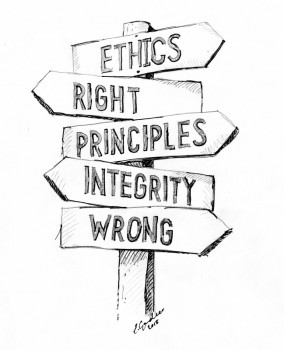
Ethics is the study of moral philosophy, which helps us to decide what is right and to act accordingly. One of the hallmarks of professional institutes is that they have developed codes of ethical behaviour that all members are required to abide by. These rules are created by professionals to deal with complex situations where right and wrong are not easily perceived and may not even be fixed.
Image credit - Liz Gardner
We have a number of resources available which deal with professional ethics
Code of conduct
The object of the Code is to promote those standards of conduct and self‐discipline required of a member in the interests of the public and in the pursuit of the study and care of the physical evidence of the human past. The Code set out the general standard of conduct to which members of the Institute are expected to adhere, and accredited professionals who subscribe to it and carry out its provisions will thereby be identified as persons professing ethical behaviour in the study and care of the historic environment.
Archaeological ethics database
This database is an ongoing project by the Register of Professional Archaeologists (the Register) and the Chartered Institute for Archaeologists (CIfA). The goal of the database is to bring together sources on archaeological ethics in a single place for the use of students, researchers, and professional archaeologists.
The archaeological ethics database includes over five hundred sources relating to ethics in archaeology.
Introduction to professional ethics
Our practice paper is a starting point to help archaeologists develop awareness of ethical issues in the profession. It examines what ethics are and what comprises ethical behaviours, and then, using specific case studies relevant to archaeology, sets out a series of questions and discussion as to how these issues could be addressed. The case studies cover topics such as gifts and hospitality, equality and diversity, conflicts of interest, and archaeology.
The paper is available for free download. Hard copies are free to CIfA members or £10 for non-members. To order your copy please email admin [at] archaeologists.net
Ethical case studies and articles
- Ethical case studies - this document includes a variety of ethical scenarios which may be familiar to professional archaeologists. These are in addition to the case studies contained in CIfAs Professional Practice Paper: An introduction to Professional Ethics. We advise that you read this practice paper before considering these case studies.
- The Archaeologist 106 - this edition of our magazine discusses the place of professional ethics, looks at how professional ethics can become a regular part of team meetings, and the how ethics are considered by museums on the archiving process.
- Ethics in human osteology
- Professional and ethical considerations around critiquing archaeological work
- Can we be catalysts for change? - This article is a think piece about how we can be catalysts for change by looking at how existing workplace cultures and pressures can have an impact on our ethical decision making and behaviours.
- Recognising and addressing conflicts of interest - Originally published in our Aim for Associate professional pathways bulletin, this article discusses the definition of a conflict of interest, how to recognise them when they occur and what you can do to avoid or resolve them.
- Code of conduct - the ethical guide to public life
E-learning module
- Everyday ethics: an introduction to professional ethics and developing your ethical knowledge - as archaeologists, we make daily ethical decisions. This module gives you an introduction to professional ethics and explains how the CIfA Code of conduct, standards and guidance help us to avoid acting unethically.

